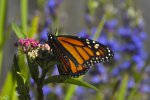Your native plant is a member of the milkweed family, and that caterpillar is
exactly why you want milkweed! Your plants are already attracting butterflies! Milkweed attracts Monarch butterflies because they lay eggs on the plant. Monarch caterpillars need milkweed to survive. The caterpillar will continue to eat the leaves until it's big enough to crawl away and form a chrysalis. While it causes visual damage, the plant itself will be just fine and come back stronger and often healthier. This looks like a fairly small plant, so my only concern would be that the caterpillars could run out of food. If you have more milkweeds, you may want to move them to one with more leaves when they get close to finishing the ones on this plant, or if you know a place where milkweed grows in the wild, you may want to bring these caterpillars to those milkweeds just so they don't run out of food. Next year, your plant will be much bigger and will be able to support caterpillars better. Once a milkweed is two or three seasons old, it's big enough that you won't really see any visual damage.
I just had this female Monarch laying eggs on my milkweed yesterday.
View attachment 103636


